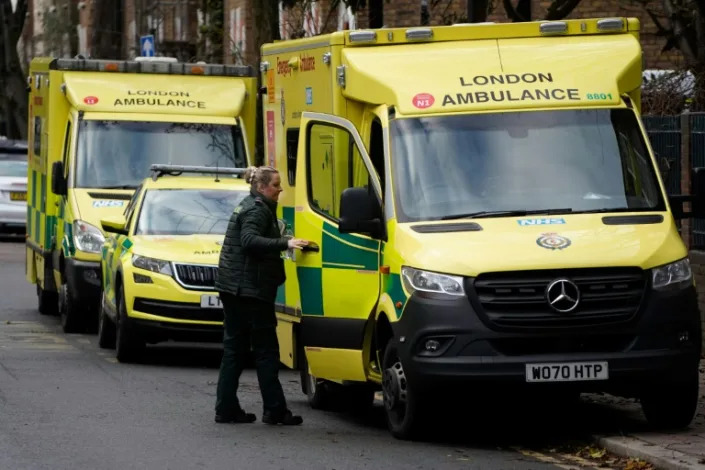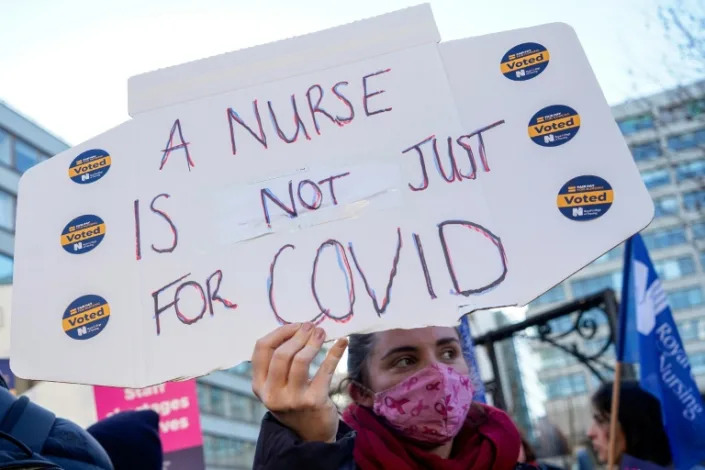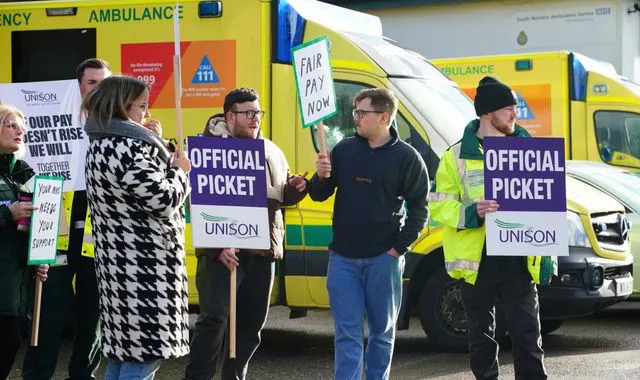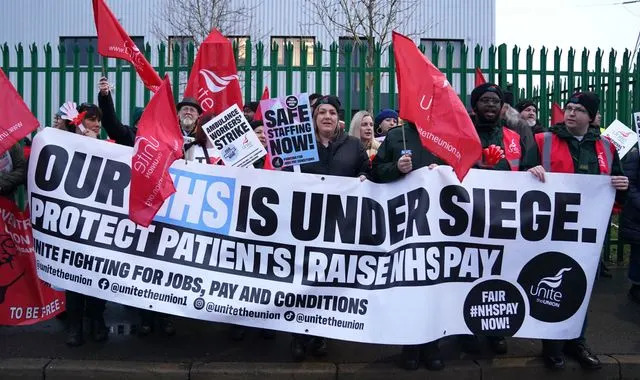
Striking ambulance workers in England and Wales manned picket lines on Wednesday, escalating a pay dispute with the government following walkouts by nurses and other public sector staff.
The series of stoppages are causing misery Britain in the run-up to Christmas, with railway workers and passport control officers set to ruin festive holiday getaways as the government vows to resist the growing pay demands.
As paramedics and call handlers walked out Wednesday, the government and unions furiously traded blame over the possible loss of life.
Health Secretary Steve Barclay, writing in the Daily Telegraph newspaper, accused the unions of making a "conscious decision" to "inflict harm" on patients.
GMB union national secretary, Rachel Harrison, hit back calling his comments "insulting" to ambulance workers, who were "forced" to strike "because year after year the government has failed to listen to them".
Employees across the UK economy are demanding salary rises above decades-high inflation -- currently running at nearly 11 percent -- which is spurring the worst cost-of-living crisis in a generation.

On Tuesday, thousands of members of the Royal College of Nursing (RCN) in England, Wales and Northern Ireland took to picket lines, five days after their first strike in its 106-year history.
Unions representing both nurses and ambulance workers in the state-run National Health Service (NHS) have threatened further stoppages in the new year if the government keeps refusing to discuss pay.
- 'Immense pressure' -
Around 40 staff formed a picket line outside West Midlands Ambulance Services' hub in Longford in central England, standing behind a banner reading "our NHS is under siege".
As passing ambulances sounded their horns in support, a Unite union representative, Steve Thompson, said the walkout was about trying to retain and improve services, as well as pay.
"This is about telling them (the government) that we are not going to allow it (a deterioration in services) to happen. We are not going to roll over," he said.

"We want the government to actually wake up and realise that this situation is serious."
Adrian Boyle, president of the Royal College of Emergency Medicine, said the UK's emergency health system had been under "immense pressure" for the last three years.
He told Times Radio the last year had been "the worst we've ever seen it" when it came to delays in getting patients into hospital from ambulances due to a lack of beds.
And he said accident and emergency departments were expecting people to make their own way to hospital on Wednesday -- even those with strokes and heart attacks.
- 'Cold shoulder' -
The government insists it must stick to modest increases for public sector workers recommended by independent pay review bodies.
"The best way to help them and help everyone else in the country is for us to get a grip and reduce inflation as quickly as possible," Prime Minister Rishi Sunak has said.
But the RCN has criticised the government's stance and accused Barclay of adopting a "macho" negotiating style during recent brief meetings.
It has warned that nurses would take wider industrial action next month if the government "keeps giving our nursing staff the cold shoulder".
Ministers have drafted in 750 military personnel to drive ambulances and perform logistics roles to mitigate the impact of Wednesday's ambulance strike which will affect almost all areas of England and Wales.
Despite the government's insistence that it will not negotiate, polls indicate most people support nurses, and to a lesser extent other workers walking out.
YouGov polling published Tuesday showed two-thirds of Britons support striking nurses, with 63-percent support for ambulance staff.
Thu, 22 December 2022 at

Health Secretary Steve Barclay is considering offering NHS staff a pay rise in spring in a bid to end strikes - but has ruled out any immediate movement on current wages.
The stalemate between unions and the government appeared to show no signs of abating on Thursday morning, following two days of historic action from nurses and paramedics.
NHS leaders have warned they are bracing for a surge in demand for emergency treatment as they urged ministers negotiate on pay to stop further walk-outs next year.
In a tweet on Thursday, Mr Barclay said his door "is always open to talk to trade unions about concerns around working conditions".
But he added: "We have an independent pay review body... and we will continue to defer to that process to ensure decisions balance the needs of staff and the wider economy."
The pay review body (PRB) has recommended pay rises of around £1,400 - about 4% - for most NHS staff, but unions say this is not enough to keep up with soaring inflation.
The government says it can't afford to make a new offer, but has not ruled out a new deal early next year.
Health workers typically receive a backdated wage increase in the summer, even though recommendations are made by the independent Pay Review Body in April.
The Telegraph has reported that Steve Barclay, the health secretary, wants next year's PRB process to be sped up so any extra money can be added to pay packets at the "earliest opportunity".
While this does not mean a new or "fast-tracked" pay offer, a source close to the cabinet minister told Sky News political correspondent Ali Fortescue that he is "keen to get moving" with the process and doesn't want it to be "bogged down" as it has been in the past.
The process of setting pay recommendations for next year is already under way and there is an "opportunity in spring to assess if pay rises are affordable", the source said.
But Unison's head of health Sara Gorton said: "Before embarking on the 2023 pay round, ministers need to accept they've not raised wages sufficiently to stop key staff from leaving the service this year.
"The pay review body process is no longer delivering for NHS staff or the government. Direct talks with ministers to solve wage issues are the way forward."
Unions - which have been calling for inflation-busting pay rises - have said they expect NHS workers to be offered a 2% increase next year, based on a letter sent by Mr Barclay to the PRB last month.
It comes after historic strike action saw thousands of nurses picket on Tuesday and ambulance staff stage their biggest strike in 30 years yesterday.
Health chiefs have stepped up calls for the government to negotiate with unions on pay as they brace for a challenging winter.
Matthew Taylor, chief executive of the NHS Confederation, told Sky News that the health service "coped as well as could be expected" during the strikes due to planning and the public making "less use of 999".
But he warned that the NHS "can't afford to drift into further industrial action across the winter" as he urged the government and trade unions to come to an agreement.
NHS 'paying price' for austerity
He said the NHS is "paying the price" for 10 years of austerity, the COVID backlog and not addressing workforce issues - as vacancies reach 130,000.
Mr Taylor said: "This winter is going to be incredibly tough, there's nothing we can do about that. But the industrial action adds to what is already a challenging situation, which is why, on behalf of leaders in the NHS, I repeat the call to the government to re-enter negotiations in good faith with the trade unions and to try to find a way of avoiding further industrial action across the winter."
Ministers have continually insisted pay negotiations are not up to them as the independent pay review bodies recommend what salary increases should be, and the government has accepted that.
The pay review bodies are made up of experts in their field without political affiliations who take evidence from a range of sources, including trade unions and staff.
Read more:
Strikes every day before Christmas - which sectors are affected and why
How A&E and other NHS services will be impacted
But last week, the GMB union - which represents tens of thousands of health workers - announced it was pulling out of the process used by the government to set NHS pay, as it questioned the independence of the PRB.
Some Tory MPs have also called on ministers to ask NHS pay reviewers to reconsider their recommendations as a way to end the strikes by offering higher rises.
The government has insisted higher pay offers are not affordable and the money would have to be taken out of frontline services.
There was no sign of the stalemate ending last night, as Unite general secretary Sharon Graham accused Mr Barclay of a "blatant lie" for saying ambulance unions had taken a "conscious decision" to inflict harm on patients.
Further ambulance strikes are planned next week, with unions threatening more action next year unless there are moves on pay talks.
Workers across several other industries are also set to strike in the build-up to Christmas.
Wed, 21 December 2022

Two days of strikes by nurses and paramedics will have a knock-on effect on appointments with a return to "very high numbers" of emergency calls in the coming days, NHS Providers has warned.
Historic strike action saw thousands of nurses picket on Tuesday and ambulance staff stage their biggest strike in 30 years yesterday.
Saffron Cordery, interim chief executive of NHS Providers, told Sky News that the next few days would be a "challenging time".
The NHS is 'haemorrhaging staff'
Talking about structural issues impacting the NHS, she said: "Staff on the frontline are significantly overstretched and we need to see a real growth in the number of staff across the whole of the NHS.
"What we've got to see now is the government come to the table and have a serious discussion and negotiation about pay because this dispute is about pay and it's also about working conditions and keeping patients safe."
Highlighting the record high of NHS vacancies, with around 130,000 posts unfilled, she said: "We know that we are haemorrhaging staff because of pay and working conditions, particularly in more junior bands of NHS staff. So, we really have to do something about that.
"And it's not just about the NHS. The government knows we need to do something about social care as well because social care is really on its knees and it needs a boost. And if if social care has a boost and the NHS frontline staff have the terms and conditions they need, then we will see an effective NHS."
'Severe effects on patient wellbeing'
The chief executive of the NHS Confederation, Matthew Taylor, told Sky News that lack of investment in the NHS was now coming to the fore: "We know we had the 10 years of austerity. It meant we went into COVID with a hundred thousand vacancies, with a crumbling estate.
"So, what we've got now is a big gap between demand and capacity."
He repeated calls to the government and trade unions to re-enter negotiations and to try to find a way of avoiding further strikes across the winter, saying: "We can't afford to drift into further industrial action."
While he said he understood both the concerns of the trade unions over pay, and the challenges facing the government over public spending, he warned: "We need leadership. We need imagination, because the health service cannot deal with a winter of industrial action without there being severe effects on patient wellbeing."
'Call 999 if you need to'
Appealing directly to anyone needing to use the NHS over the coming days, he said: "Primary care has not been affected by the industrial action... If you have concerns about your health, contact your GP. If you have an emergency, contact 999. If you're not sure, ring 111. The services are there and do use them."
The number of people calling 999 appeared to drop in some parts of England yesterday, and NHS Providers - the membership organisation for NHS hospital, mental health, community and ambulance services - said there had been "varying levels of disruption" across the country.
It said some demand had shifted to other services or not materialised as expected.
But the organisation said demand for care across the whole healthcare system remained high and trust leaders were reporting ongoing delays to ambulance services and overcrowding at some accident and emergency departments.
Nurses, ambulance staff, railway and postal workers have now returned to work, however, there are more strikes taking place today - with highway workers and driving test examiners among those downing tools.
The military steps in
NHS England said at least 11,509 staff were absent from work across England during strikes by the Royal College of Nursing (RCN) on Tuesday and 13,797 appointments and procedures had to be rescheduled.
Members of the military stepped in to take the place of ambulance workers yesterday, with trusts telling patients to only call 999 in the case of a life-threatening injury.
The next ambulance strike is due to take place on 28 December.
Read more:
Strikes every day before Christmas - which sectors are affected and why
Government could fast-track NHS pay rise
Meanwhile, reports said the government could fast-track an NHS pay rise next year.
The Daily Telegraph reported that Health Secretary Steve Barclay is poised to offer an expedited pay deal after unions and ministers remained mired in a stalemate over pay conditions.
The paper said a source close to Mr Barclay, who has been criticised by unions for suggesting striking health workers had "made a conscious choice to inflict harm on patients", revealed he is keen to "speed up the process" of giving NHS staff a pay rise early next year.
Unions have said they expect NHS workers to be offered a 2% increase next year based on a letter Mr Barclay sent last month to the NHS Pay Review Body.
Wales strike action 'upsetting to all'
Doctors in Wales are considering taking strike action for the first time, the British Medical Association Cymru has said.
Almost two-thirds of hospital doctors surveyed by the union said they would be willing to take some form of industrial action over pay and conditions.
Iona Collins, the BMA's Welsh Council chairwoman, called the survey "upsetting to all" and said it is "gut-wrenching for doctors to consider walking away from work".
She added: "Without action now, patients will continue to suffer as a direct consequence of an under-funded NHS with insufficient direct clinical care."
In October, the BMA announced that a ballot for industrial action by junior doctors in England will open on 9 January.
Just under 1,000 doctors in Wales responded to the survey seeking views on a 4.5% pay award from the Welsh government - with 78% of those who answered saying they want a pay rise matching or exceeding inflation.
Dr Collins said: "Doctors have been quietly quitting the NHS for years, by reducing their contracted hours or leaving altogether. The financial incentive to remain in the NHS has eroded over the last decade."
Who's striking today?
National Highways workers will begin a walkout in London and the south east of England, which will last until Christmas Day.
This will affect officers who work in the aftermath of accidents as well as call centre staff. National Highways have said no roads will be closed as a result of the strike.
Workers for the Driver and Vehicle Standards Agency (DVSA) in the north west of England, Yorkshire and Humber and North Wales will stop work.
Driving test examiners will also be striking, affecting driving test centres in north west England and Yorkshire and the Humber. Theory tests will not be affected.
Rural Payments Agency (RPA) staff will continue their walkout and Unison workers at the Environment Agency will refuse to provide on-call cover for unexpected incidents.
Unite members working for Highlands and Islands Airports will also be striking.
No comments:
Post a Comment